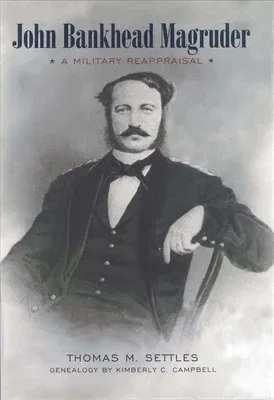Of all the major figures of the Civil War era, Confederate general John
Bankhead Magruder is perhaps the least understood. The third-ranking
officer in Virginia's forces behind Robert E. Lee and Joseph E.
Johnston, Magruder left no diary, no completed memoirs, no will, not
even a family Bible. There are no genealogical records and very few
surviving personal papers. Unsurprisingly, then, much existing
literature about Magruder contains incorrect information. In John
Bankhead Magruder, an exhaustive biography that reflects more than
thirty years of painstaking archival research, Thomas M. Settles
remedies the many factual inaccuracies surrounding this enigmatic man
and his military career.
Settles traces Magruder's family back to its seventeenth-century British
American origins, describes his educational endeavors at the University
of Virginia and West Point, and details his early military career and
his leading role as an artillerist in the war with Mexico. Tall,
handsome, and flamboyant, Magruder earned the nickname "Prince John"
from his army friends and was known for his impeccable manners and
social brilliance. When Virginia seceded in April of 1861, Prince John
resigned his commission in the U.S. Army and offered his services to the
Confederacy.
Magruder won the opening battle of the Civil War at Big Bethel. Later,
in spite of severe shortages of weapons and supplies and a lack of
support from Jefferson Davis, Judah P. Benjamin, Samuel Cooper, and
Joseph E. Johnston, Prince John, with just 13,600 men, held his position
on the Peninsula for a month against George B. McClellan's 105,000-man
Federal army. This successful stand, at a time when Richmond was
exceedingly vulnerable, provided, according to Settles, John Magruder's
greatest contribution to the Confederacy.
Following the Seven Days' battles, however, his commanders harshly
criticized Magruder for being too slow at Savage Station, then too rash
at Malvern Hill and they transferred him to command the District of
Texas, New Mexico, and Arizona. In Texas, he skillfully recaptured the
port of Galveston in early 1863 and held it for the Confederacy until
the end of the war. After the war, he joined the Confederate exodus to
Mexico but eventually returned to the United States, living in New York
City and New Orleans before settling in Houston, where he died on
February 18, 1871.
John Bankhead Magruder offers fresh insight into many aspects of the
general's life and legacy, including his alleged excesses, his family
relationships, and the period between Magruder's death and his
memorialization into the canon of Lost Cause mythology. With engaging
prose and impressive research, Settles brings this vibrant Civil War
figure to life.

